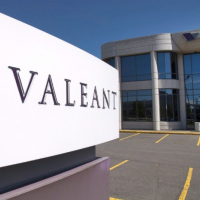Innovation and Persistence Bring Over-Priced Rx Drugs to California

The stock of giant Valeant Pharmaceuticals International did not drop 32% last week because of questions raised about whether the company is peddling its drugs in California through a company barred by the state from doing business here.
The plunge, which initially wiped out $20 billion of value, was precipitated by short-seller Citron Research’s report about Valeant’s accounting system and use of certain pharmacies to supply its drugs. The report resonated with investors who have watched the meteoric rise of the company, fueled by dealmaking, and aggressive drug pricing, not research and development.
It may also have resonated with the California Board of Pharmacy, which denied Philidor Rx Services a license to operate in the state in May 2014. The board, which is in the Department of Consumer Affairs, accused the company of making “false statements” about who owned and operated the company.
It wasn’t until last week that Valeant revealed it was close enough to Philidor to have an option to buy it. And Charles Ornstein at ProPublica, using documents from the board and the Delaware secretary of state’s office, described how Philidor “used a backdoor approach” to circumvent the board and continued to deliver Valeant’s drugs to the state.
In a tale too complicated to properly convey in a blog, Valeant claims it sold its drugs through R&O Pharmacy, based in Ventura County’s Camarillo. They may be connected through Philidor and West Wilshire Pharmacy in Los Angeles, but regardless of how they are linked, Valeant claims that R&O owes them $68 million for drugs it provided. R&O says it has no invoice record of handling Valeant drugs.
So, what’s the problem with Valeant’s drugs?
The New York Times led a story last week with an anecdote that illustrates one of the reasons the federal government and states are taking a hard look at companies that use a business model like Valeant’s. Horizon Pharma makes a combo drug, Duexis, that costs $1,200 a month, compared to a total of $40 tops for both generic equivalents of Motrin and Pepcid.
Left to their own devices, doctors would probably prescribe the cheaper drugs. But pharmacies connected to Horizon work a deal with doctors to handle the prescriptions through their mail-order business. The doctor avoids daily contact with pharmacies and the companies deal with perturbed insurers and patients.
It’s a win-win for Valeant and doctors. Lose-lose for patients and insurers.
Despite revelations of the past couple weeks, and admissions by Valeant, it is apparent that much about the labyrinth remains unknown. It won’t stay that way for long. Federal prosecutors in Massachusetts and Manhattan have issued subpoenas seeking information about the company’s business practices.
Specialty pharmacies like Valeant and Horizon used to make their money handling complex, expensive drugs that treated serious conditions, like multiple sclerosis. But they found that the same conduits could be used to move acne and arthritis medications with jacked-up prices.
Valeant said that the list prices for its branded drugs in the Unites States increased 36% last year.
–Ken Broder
To Learn More:
Documents Raise New Questions About Valeant’s Pharmacy Relationships in California (by Charles Ornstein, ProPublica)
Valeant Slumps Again After Rebutting Critical Report (by Jonathan D. Rockoff and Maureen Farrell, Wall Street Journal)
Valeant Pharmaceuticals’ Philidor Rx Unit Says It Has a Right to Buy R&O Pharmacy (by Antoine Gara, Forbes)
Drug Makers Sidestep Barriers on Pricing (by Andrew Pollack, New York Times)
- Top Stories
- Controversies
- Where is the Money Going?
- California and the Nation
- Appointments and Resignations
- Unusual News
- Latest News
- California Forbids U.S. Immigration Agents from Pretending to be Police
- California Lawmakers Urged to Strip “Self-Dealing” Tax Board of Its Duties
- Big Oil’s Grip on California
- Santa Cruz Police See Homeland Security Betrayal in Use of Gang Roundup as Cover for Immigration Raid
- Oil Companies Face Deadline to Stop Polluting California Groundwater





